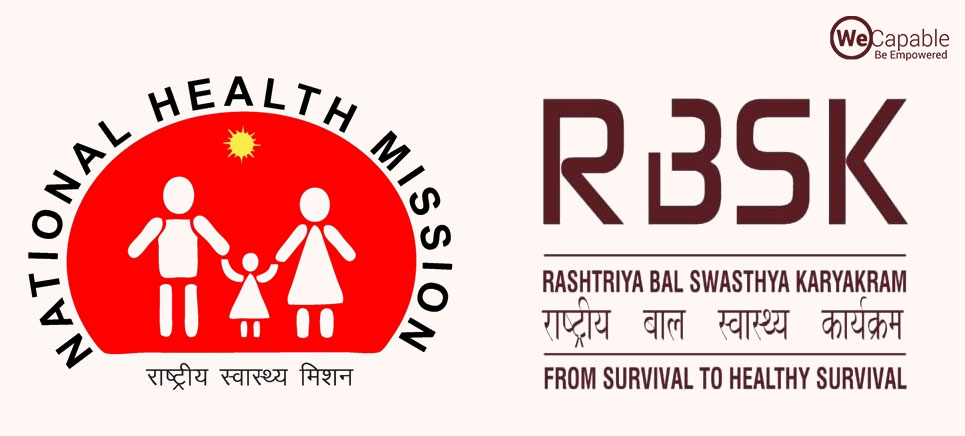Rashtriya Bal Swasthya Karyakram (RBSK) is an ambitious initiative by the Government of India for Child Health Screening and Early Intervention Services. This programme is a systematic approach for early identification of medical conditions and providing the required intervention thereof. The initiative is said to cover four Ds – Defects at Birth, Diseases in Children, Deficiency Conditions and Developmental Delays including Disability. Let us learn about Rashtriya Bal Swasthya Karyakram and its importance in detail.
Background of the Initiative
India, as a country, has witnessed significant progress in reducing the rate of infant mortality through its National Rural Health Mission Programmes. The next step after reducing the mortality rate was obviously to improve the survival outcome i.e. early detection and management of conditions that were not covered in earlier programmes.
A survey indicated that out of 100 babies born in the country 6-7 have a birth defect. Further, children of the pre-school age get affected by nutritional deficiencies (percentage varies from 4-70% depending on various factors). At least 10% of the children suffer from developmental delays that may lead to permanent disabilities if proper and timely intervention is not provided.
Keeping in view the above-mentioned conditions, the Government of India launched Rashtriya Bal Swasthya Karyakram (RBSK). The initiative aims at the early detection and intervention of medical conditions for children from birth to the age of 18. As mentioned earlier, it covers four Ds:
- Defects at Birth
- Diseases in Children
- Deficiency Conditions
- Developmental Delays including Disabilities

The Targeted Beneficiaries of the Initiative
The targeted beneficiaries of the initiative are children up to 18 years of age belonging to rural areas and urban slums. The children are categorized into three groups as different tools will be required for screening and different sets of conditions would be prioritized at different age groups.
- Babies born at Public Health Facilities and at Home (Age up to 6 weeks)
- Preschool children in Rural areas and Urban Slums (Age from 6 weeks to 6 years)
- Children from class 1 to 12 in Government and Government aided schools (Age from 6 years – 18 years)
The Mechanism of Screening Children
The child screening under Rashtriya Bal Swasthya Karyakram is done at two levels – Community level and Facility level.
The Community level screening is done by mobile health teams at Anganwadi centers and government and government-aided schools. This is to ensure that all children enrolled in Anganwadi or Government Schools are screened for any medical condition and provided timely intervention, if needed.
The Facility Level screening is done at the existing medical facilities like Primary Health Centers, Community Health Centers, and District Hospitals.
Screening at Anganwadi Centers
Preschool children i.e. children below the age of 6 are screened by mobile health teams at the Anganwadi centers. The children are screened for deficiencies, diseases and development delays including disability at least twice a year. If a child shows any symptoms of development delays she is referred to the District Early Intervention Centre (DEIC) for further management of her condition.
Screening at Schools
Mobile Health teams screen children between 6 and 18 years at their respective government or government-aided schools. The children of this age group are screened for deficiencies, diseases, development delays including disability and adolescent health issues. The screening is done at least once a year.
Health Conditions to be Screened and Managed
The child health screening and early intervention services under the RBSK scheme cover 30 selected health conditions. States and Union Territories have the option to include hypothyroidism, sickle cell anaemia and beta-thalassemia while the other 29 conditions are mandatory to be screened. Once the child is screened for any of the conditions and referred from any point of identification, the child is given the required intervention and support at zero cost to the family.
Here is the list of 30 conditions covered under RBSK
Defects at Birth
- Neural tube defect
- Down’s syndrome
- Cleft Lip & Palate / Cleft palate alone
- Talipes (club foot)
- Developmental dysplasia of the hip
- Congenital cataract
- Congenital deafness
- Congenital heart diseases
- Retinopathy of Prematurity
Deficiencies
- Anaemia (especially severe anaemia)
- Vitamin A deficiency (Bitot’s spots)
- Vitamin D Deficiency (Rickets)
- Severe Acute Malnutrition
- Goiter
Diseases of Childhood
- Skin conditions (Scabies, fungal infection and Eczema)
- Otitis Media
- Rheumatic heart disease
- Reactive airway disease
- Dental conditions
- Convulsive disorders
Developmental Delays and Disabilities
- Vision Impairment
- Hearing Impairment
- Neuro-motor Impairment
- Motor delay
- Cognitive delay
- Language delay
- Behavior disorder (Autism)
- Learning disorder
- Attention Deficit Hyperactivity Disorder (ADHD)
- Congenital Hypothyroidism, Sickle cell anemia, Beta-thalassemia (Optional for the States and UTs)
Use the citation below to add this article to your bibliography
"Rashtriya Bal Swasthya Karyakram (RBSK): Ensuring the Health of Children of India." Wecapable.com. Web. May 30, 2025. <https://wecapable.com/rashtriya-bal-swasthya-karyakram-rbsk/>
Wecapable.com, "Rashtriya Bal Swasthya Karyakram (RBSK): Ensuring the Health of Children of India." Accessed May 30, 2025. https://wecapable.com/rashtriya-bal-swasthya-karyakram-rbsk/
"Rashtriya Bal Swasthya Karyakram (RBSK): Ensuring the Health of Children of India." (n.d.). Wecapable.com. Retrieved May 30, 2025 from https://wecapable.com/rashtriya-bal-swasthya-karyakram-rbsk/

Leave a Reply